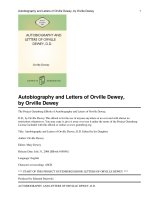Everybody''''s Business is Nobody''''s Business, by Daniel DefoeThe Project Gutenberg docx
Bạn đang xem bản rút gọn của tài liệu. Xem và tải ngay bản đầy đủ của tài liệu tại đây (242.67 KB, 90 trang )
Everybody's Business is
Nobody's Business, by
Daniel Defoe
The Project Gutenberg eBook, Everybody's
Business is Nobody's Business, by
Daniel Defoe
This eBook is for the use of anyone
anywhere at no cost and with
almost no restrictions whatsoever. You may
copy it, give it away or
re-use it under the terms of the Project
Gutenberg License included
with this eBook or online at
www.gutenberg.net
Title: Everybody's Business is Nobody's
Business
Author: Daniel Defoe
Release Date: April 20, 2005 [eBook #2052]
Language: English
Character set encoding: ISO-646-US (US-
ASCII)
***START OF THE PROJECT GUTENBERG EBOOK
EVERYBODY'S BUSINESS IS NOBODY'S
BUSINESS***
Transcribed from the 1889 George Bell &
Sons edition by David Price, email
EVERYBODY’S
BUSINESS IS
NOBODY’S
BUSINESS
or,
PRIVATE ABUSES, PUBLIC
GRIEVANCES:
EXEMPLIFIED
In the Pride, Insolence, and exorbitant
Wages of our Women, Servants, Footmen,
&c.
WITH
A Proposal for Amendment of the same;
as also for clearing the Streets of those
Vermin called Shoe-Cleaners, and
substituting in their stead many Thousands
of industrious Poor, now ready to starve.
With divers other Hints of great Use to the
Public.
Humbly submitted the Consideration of
our Legislature, and the careful Perusal of
all Masters and Mistresses of Families.
BY ANDREW MORETON, Esq.
The Fifth Edition, with the Addition of a
Preface.
LONDON:
Printed for W. MEADOWS, in Cornhill;
and sold by T. WARNER, at the Black
Boy in Pater-Noster Row; A. DODD,
without Temple Bar; and E. NUTT, at the
Royal Exchange. 1725.
Price Six Pence.]
THE PREFACE
Since this little book appeared in print, it
has had no less than three answers, and
fresh attacks are daily expected from the
powers of Grub-street; but should
threescore antagonists more arise, unless
they say more to the purpose than the
forementioned, they shall not tempt me to
reply.
Nor shall I engage in a paper war, but
leave my book to answer for itself, having
advanced nothing therein but evident
truths, and incontestible matters of fact.
The general objection is against my style;
I do not set up for an author, but write only
to be understood, no matter how plain.
As my intentions are good, so have they
had the good fortune to meet with
approbation from the sober and substantial
part of mankind; as for the vicious and
vagabond, their ill-will is my ambition.
It is with uncommon satisfaction I see the
magistracy begin to put the laws against
vagabonds in force with the utmost vigour,
a great many of those vermin, the
japanners, having lately been taken up and
sent to the several work-houses in and
about this city; and indeed high time, for
they grow every day more and more
pernicious.
My project for putting watchmen under
commissioners, will, I hope, be put in
practice; for it is scarce safe to go by
water unless you know your man.
As for the maid-servants, if I undervalue
myself to take notice of them, as they are
pleased to say, it is because they
overvalue themselves so much they ought
to be taken notice of.
This makes the guilty take my subject by
the wrong end, but any impartial reader
may find, I write not against servants, but
bad servants; not against wages, but
exorbitant wages, and am entirely of the
poet’s opinion,
The good should meet with favour
and applause,
The wicked be restrain’d by
wholesome laws.
The reason why I did not publish this book
till the end of the last sessions of
parliament was, because I did not care to
interfere with more momentous affairs; but
leave it to the consideration of that august
body during this recess, against the next
sessions, when I shall exhibit another
complaint against a growing abuse, for
which I doubt not but to receive their
approbation and the thanks of all honest
men.
EVERYBODY’S
BUSINESS IS
NOBODY’S
BUSINESS
This is a proverb so common in
everybody’s mouth, that I wonder nobody
has yet thought it worth while to draw
proper inferences from it, and expose
those little abuses, which, though they
seem trifling, and as it were scarce worth
consideration, yet, by insensible degrees,
they may become of injurious consequence
to the public; like some diseases, whose
first symptoms are only trifling disorders,
but by continuance and progression, their
last periods terminate in the destruction of
the whole human fabric.
In contradiction therefore to this general
rule, and out of sincere love and well
meaning to the public, give me leave to
enumerate the abuses insensibly crept in
among us, and the inconveniences daily
arising from the insolence and intrigues of
our servant-wenches, who, by their
caballing together, have made their party
so considerable, that everybody cries out
against them; and yet, to verify the
proverb, nobody has thought of, or at least
proposed a remedy, although such an
undertaking, mean as it seems to be, I hope
will one day be thought worthy the
consideration of our king, lords, and
commons.
Women servants are now so scarce, that
from thirty and forty shillings a year, their
wages are increased of late to six, seven,
nay, eight pounds per annum, and
upwards; insomuch that an ordinary
tradesman cannot well keep one; but his
wife, who might be useful in his shop or
business, must do the drudgery of
household affairs; and all this because our
servant-wenches are so puffed up with
pride nowadays, that they never think they
go fine enough: it is a hard matter to know
the mistress from the maid by their dress;
nay, very often the maid shall be much the
finer of the two. Our woollen manufacture
suffers much by this, for nothing but silks
and satins will go down with our kitchen-
wenches; to support which intolerable
pride, they have insensibly raised their
wages to such a height as was never
known in any age or nation but this.
Let us trace this from the beginning, and
suppose a person has a servant-maid sent
him out of the country, at fifty shillings, or
three pounds a year. The girl has scarce
been a week, nay, a day in her service, but
a committee of servant-wenches are
appointed to examine her, who advise her
to raise her wages, or give warning; to
encourage her to which, the herb-woman,
or chandler-woman, or some other old
intelligencer, provides her a place of four
or five pounds a year; this sets madam
cock-a-hoop, and she thinks of nothing
now but vails and high wages, and so
gives warning from place to place, till she
has got her wages up to the tip-top.
Her neat’s leathern shoes are now
transformed into laced ones with high
heels; her yarn stockings are turned into
fine woollen ones, with silk clocks; and
her high wooden pattens are kicked away
for leathern clogs; she must have a hoop
too, as well as her mistress; and her poor
scanty linsey-woolsey petticoat is changed
into a good silk one, for four or five yards
wide at the least. Not to carry the
description farther, in short, plain country
Joan is now turned into a fine London
madam, can drink tea, take snuff, and carry
herself as high as the best.
If she be tolerably handsome, and has any
share of cunning, the apprentice or her
master’s son is enticed away and ruined
by her. Thus many good families are
impoverished and disgraced by these pert
sluts, who, taking the advantage of a young
man’s simplicity and unruly desires, draw
many heedless youths, nay, some of good
estates, into their snares; and of this we
have but too many instances.
Some more artful shall conceal their
condition, and palm themselves off on
young fellows for gentlewomen and great
fortunes. How many families have been
ruined by these ladies? when the father or
master of the family, preferring the flirting
airs of a young prinked up strumpet, to the
artless sincerity of a plain, grave, and
good wife, has given his desires aloose,
and destroyed soul, body, family, and
estate. But they are very favourable if
they wheedle nobody into matrimony, but
only make a present of a small live
creature, no bigger than a bastard, to some
of the family, no matter who gets it; when
a child is born it must be kept.
Our sessions’ papers of late are crowded
with instances of servant-maids robbing
their places, this can be only attributed to
their devilish pride; for their whole
inquiry nowadays is, how little they shall
do, how much they shall have.
But all this while they make so little
reserve, that if they fall sick the parish
must keep them, if they are out of place,
they must prostitute their bodies, or starve;
so that from clopping and changing, they
generally proceed to whoring and
thieving, and this is the reason why our
streets swarm with strumpets.
Thus many of them rove from place to
place, from bawdy-house to service, and
from service to bawdy-house again, ever
unsettled and never easy, nothing being
more common than to find these creatures
one week in a good family, and the next in
a brothel. This amphibious life makes
them fit for neither, for if the bawd uses
them ill, away they trip to service, and if
the mistress gives them a wry word, whip
they are at a bawdy-house again, so that in
effect they neither make good whores nor
good servants.
Those who are not thus slippery in the tail,
are light of finger; and of these the most
pernicious are those who beggar you
inchmeal. If a maid is a downright thief
she strips you, it once, and you know your
loss; but these retail pilferers waste you
insensibly, and though you hardly miss it,
yet your substance shall decay to such a
degree, that you must have a very good
bottom indeed not to feel the ill effects of
such moths in your family.
Tea, sugar, wine, &c., or any such trifling
commodities, are reckoned no thefts, if
they do not directly take your pewter from
your shelf, or your linen from your
drawers, they are very honest: What harm
is there, say they, in cribbing a little
matter for a junket, a merry bout or so?
Nay, there are those that when they are
sent to market for one joint of meat, shall
take up two on their master’s account, and
leave one by the way, for some of these
maids are mighty charitable, and can make
a shift to maintain a small family with
what they can purloin from their masters
and mistresses.
If you send them with ready money, they
turn factors, and take threepence or
fourpence in the shilling brokerage. And
here let me take notice of one very heinous
abuse, not to say petty felony, which is
practised in most of the great families
about town, which is, when the tradesman
gives the house-keeper or other
commanding servant a penny or twopence
in the shilling, or so much in the pound,
for everything they send in, and which,
from thence, is called poundage.
This, in my opinion, is the greatest of
villanies, and ought to incur some
punishment, yet nothing is more common,
and our topping tradesmen, who seem
otherwise to stand mightily on their credit,
make this but a matter of course and
custom. If I do not, says one, another will
(for the servant is sure to pick a hole in
the person’s coat who shall not pay
contribution). Thus this wicked practice
is carried on and winked at, while
receiving of stolen goods, and
confederating with felons, which is not a
jot worse, is so openly cried out against,
and severely punished, witness Jonathan
Wild.
And yet if a master or mistress inquire
after anything missing, they must be sure to
place their words in due form, or madam
huffs and flings about at a strange rate,
What, would you make a thief of her?
Who would live with such mistrustful
folks? Thus you are obliged to hold your
tongue, and sit down quietly by your loss,
for fear of offending your maid, forsooth!
Again, if your maid shall maintain one,
two, or more persons from your table,
whether they are her poor relations,
countryfolk, servants out of place, shoe-
cleaners, charwomen, porters, or any
other of her menial servants, who do her
ladyship’s drudgery and go of her errands,
you must not complain at your expense, or
ask what has become of such a thing, or
such a thing; although it might never so
reasonably be supposed that it was
altogether impossible to have so much
expended in your family; but hold your
tongue for peace sake, or madam will say,
You grudge her victuals; and expose you
to the last degree all over the
neighbourhood.
Thus have they a salve for every sore,
cheat you to your face, and insult you into
the bargain; nor can you help yourself
without exposing yourself, or putting
yourself into a passion.
Another great abuse crept in among us, is
the giving of veils to servants; this was
intended originally as an encouragement to
such as were willing and handy, but by
custom and corruption it is now grown to
be a thorn in our sides, and, like other
good things, abused, does more harm than
good; for now they make it a perquisite, a
material part of their wages, nor must their
master give a supper, but the maid expects
the guests should pay for it, nay,
sometimes through the nose. Thus have
they spirited people up to this unnecessary
and burthensome piece of generosity
unknown to our forefathers, who only gave
gifts to servants at Christmas-tide, which
custom is yet kept into the bargain;
insomuch that a maid shall have eight
pounds per annum in a gentleman’s or
merchant’s family. And if her master is a
man of free spirit, who receives much
company, she very often doubles her
wages by her veils; thus having meat,
drink, washing, and lodging for her
labour, she throws her whole income upon
her back, and by this means looks more
like the mistress of the family than the
servant-wench.
And now we have mentioned washing, I
would ask some good housewifely
gentlewoman, if servant-maids wearing
printed linens, cottons, and other things of
that nature, which require frequent
washing, do not, by enhancing the article
of soap, add more to housekeeping than
the generality of people would imagine?
And yet these wretches cry out against
great washes, when their own unnecessary
dabs are very often the occasion.
But the greatest abuse of all is, that these
creatures are become their own
lawgivers; nay, I think they are ours too,
though nobody would imagine that such a









